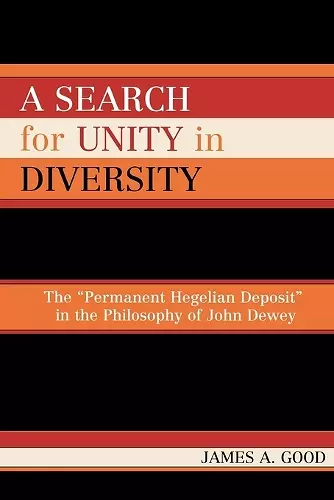A Search for Unity in Diversity
The 'Permanent Hegelian Deposit' in the Philosophy of John Dewey
Format:Paperback
Publisher:Lexington Books
Published:13th Dec '05
Currently unavailable, and unfortunately no date known when it will be back
This paperback is available in another edition too:
- Hardback£113.00(9780739110614)

A Search for Unity in Diversity examines the traditional readings of John Dewey's relationship to Hegel and demonstrates that Dewey's later pragmatism was a development of the historicist/humanistic Hegel, rather than a turning away from Hegelian philosophy. Good argues that Dewey drew upon resources he found in the writings of St. Louis Hegelians to fashion a non-metaphysical reading of Hegel. A Search for Unity in Diversity reasons that Hegel encouraged Dewey to understand philosophy as an exercise in individual and cultural reconstruction. Beyond exposing fatal flaws in the traditional reading of Dewey's relationship to Hegel, Good shows that Dewey's pragmatism is a development, rather than a rejection, of Hegel's philosophy. This not only explains Dewey's Hegelian deposit, it also sheds light on why recent Hegel scholars have found elements of pragmatism in Hegel's thought and provides grounds for rapprochment between American pragmatism and Continental European philosophy.
With a rare and impressive blend of philosophical sophistication and historical scholarship James Good sheds a penetrating light on John Dewey’s intellectual indebtedness to Hegel, a subject of considerable controversy among Deweyan scholars and biographers. Good’s judicious handling of this contentious topic makes A Search for Unity in Diversity a book that is bound to interest not only Dewey's many critics and admirers but all who are broadly interested in the history and current status of American philosophy. -- Phillip W. Jackson, University of Chicago
In this work of broad reach and meticulous scholarship, James A. Good illuminates one of the most obscured issues in the history of late nineteenth and early twentieth century philosophy: John Dewey’s relationship to the intellectual legacy of G. W. F. Hegel. His arguments are both novel and convincing. Good is certain to alter the way we think about American philosophy. -- Larry A. Hickman, Southern Illinois University Carbondale
The standard account of John Dewey’s philosophical development has always presented his break with Hegelianism as one of the central junctures of his career. Dewey himself testified to the importance of this break, which has made its stark factuality seem all the more indisputable. But, as James Good shows in this fascinating and meticulous study, such an assertion depends upon an imperfect understanding of Hegel, and a failure to recognize that there was a permanent “Hegelian deposit” that continued to be an essential factor in the shaping of Dewey’s mature thinking. Good confronts us with the embarrassing possibility that we have fallen into a most un-Deweyan form of dualism in the way we think about the philosopher’s shift “from absolutism to experimentalism.” In doing so, Good also confronts us with the extent to which we have misconstrued and underestimated Hegel’s enduring influence on, and in, American intellectual life. One hopes that the appearance of this valuable book will begin to reverse that state of affairs. -- Wilfred M. McClay, University of Oklahoma
James Good makes a compelling case that the 'Hegelian deposit' in John Dewey's thinking was not only a deeper and more persistent vein than others have contended, but also a different, and richer, sort of ore than most have recognized. His is a splendid, eye-opening contribution to American intellectual history, and a welcome case for a Dewey—and a Hegel—who have much still to offer an unsparing yet hopeful cultural criticism. -- Robert Westbrook, professor of history, University of Rochester; author of John Dewey and American Democracy
By tracing many of John Dewey's most powerful ideas (including his theory of inquiry, holism, functionalism, and even Dewey's approach to experience) to their origin in Hegel, Jim Good's remarkable book opens up new horizons in Deweyan scholarship. Good shows in detail how Dewey reconstructed Hegel into a robust naturalistic pragmatism. Those unfamiliar with Hegel's philosophy will appreciate Good's clear and crisp exposition. Those who already feel comfortable with Dewey's thought will be surprised at how easy they can grasp Hegel. -- Jim Garrison, Virginia Tech
ISBN: 9780739113608
Dimensions: 225mm x 165mm x 25mm
Weight: 458g
325 pages